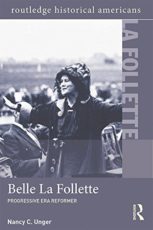With Nancy Unger, professor of history at Santa Clara University and author of the book Belle La Follete: Progressive Era Reformer.
About the Book:
 In 1931, the New York Times hailed Belle Case La Follette as “probably the least known yet most influential of all the American women who have had to do with public affairs.” A dedicated advocate for women’s suffrage, peace, and other causes, she served as a key advisor to her husband, leading Progressive politician Robert La Follette. She also wielded considerable influence through her own speeches and journalism, as when she opposed racism by speaking out against the segregation of the federal government under President Woodrow Wilson.
In 1931, the New York Times hailed Belle Case La Follette as “probably the least known yet most influential of all the American women who have had to do with public affairs.” A dedicated advocate for women’s suffrage, peace, and other causes, she served as a key advisor to her husband, leading Progressive politician Robert La Follette. She also wielded considerable influence through her own speeches and journalism, as when she opposed racism by speaking out against the segregation of the federal government under President Woodrow Wilson.
In a concise, lively, and engaging narrative, Nancy C. Unger shows how Belle La Follette uniquely contributed to progressive reform, as well as the ways her work was typical of women–and progressives–of her time. Supported by primary documents and a robust companion website, this book introduces us to an extraordinary woman and the era of Progressive reform.
And
Mark Herstgaard, author, journalist, broadcaster and public speaker Mark Hertsgaard has published seven books including: HOT: Living Through the Next Fifty Years on Earth (2011), Earth Odyssey: Around the World In Search of Our Environmental Future (1999), A Day in the Life: The Music and Artistry of the Beatles (1995), and On Bended Knee: The Press and the Reagan Presidency (1988). And his latest Bravehearts: Whistle Blowing in the Age of Snowden (2016)
About the book:
 Whistleblowers pay with their lives to save ours. When insiders like former NSA analyst Edward Snowden or ex-FBI agent Coleen Rowley or Big Tobacco truth-teller Jeffrey Wigand blow the whistle on high-level lying, lawbreaking or other wrongdoing—whether it’s government spying, corporate murder or scientific scandal—the public benefits enormously. Wars are ended, deadly products are taken off the market, white-collar criminals are sent to jail. The whistleblowers themselves, however, generally end up ruined. Nearly all of them lose their jobs—and in many cases their marriages and their health—as they refuse to back down in the face of increasingly ferocious official retaliation. That moral stubbornness despite terrible personal cost is the defining DNA of whistleblowers. The public owes them more than we know.
Whistleblowers pay with their lives to save ours. When insiders like former NSA analyst Edward Snowden or ex-FBI agent Coleen Rowley or Big Tobacco truth-teller Jeffrey Wigand blow the whistle on high-level lying, lawbreaking or other wrongdoing—whether it’s government spying, corporate murder or scientific scandal—the public benefits enormously. Wars are ended, deadly products are taken off the market, white-collar criminals are sent to jail. The whistleblowers themselves, however, generally end up ruined. Nearly all of them lose their jobs—and in many cases their marriages and their health—as they refuse to back down in the face of increasingly ferocious official retaliation. That moral stubbornness despite terrible personal cost is the defining DNA of whistleblowers. The public owes them more than we know.
In Bravehearts, Hertsgaard tells the gripping, sometimes darkly comic and ultimately inspiring stories of the unsung heroes of our time. A deeply reported, impassioned polemic, Bravehearts is a book for citizens everywhere—especially students, teachers, activists and anyone who wants to make a difference in the world around them.

